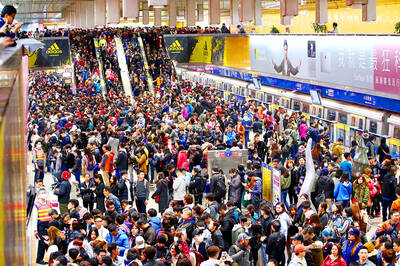Premier Liu Chao-shiuan (劉兆玄) said yesterday that Taiwan would standardize light-emitting-diode (LED) products with China to tap into the global market in the face of intense competition from Japan, South Korea, Germany and the US.
Liu said the government would talk with its Chinese counterpart to reach an agreement on the standardization of LEDs and a certification system in June as part of the government’s “Bridge-Building Plan (搭橋計畫),” which is aimed at establishing a platform for cross-strait industrial cooperation.
Cross-strait cooperation in the LED illumination industry will turn Taiwan and China into “a global production center of LED products,” Liu said.
Liu made the remarks when speaking to executives of Epistar Corporation (晶元光電) during his visit to the country’s biggest supplier of high brightness LED (HB LED) epiwafers and chips.
The proposal garnered positive response from Epistar, with general manager Chou Ming-chun (周銘俊) saying that the government should cooperate with China to boost the LED industry.
“China has spared no efforts in subsidizing its LED and illumination industry, and that has prompted low-price competition with Taiwan,” Chou said.
He said that technological breakthroughs in South Korea and China in recent years also posed a threat to Taiwan’s LED industry.
“Cooperating with China would help local industries explore the Chinese market,” he said.
Earlier yesterday, Liu visited Motech Industrial Inc, the world’s eighth largest manufacturer of solar cells, to promote his Cabinet’s recent proposal to develop the renewable energy industry. Stressing the government’s determination to develop the country’s renewable energy sector, Liu said the Cabinet would establish a special team for resolving difficulties facing the renewable resources industry.
“It would be a service-oriented platform supported by all government agencies because it will respond to any requests in a rapid way,” Liu said.
Motech chairman Simon Tsuo (左元淮) told Liu that focusing primarily on cell and wafer manufacturing with a limited presence in the upstream raw materials market and the downstream applications market was a potential risk for Taiwanese solar firms.
“Despite holding a key position in the supply chain of the global solar industry, Taiwan lags behind in the development of a domestic consumer market for solar applications,” he said.
Tainan County Commissioner Su Huan-chih (蘇煥智) of the Democratic Progressive Party urged Liu to revise any regulations that make businesses hesitant to invest in solar energy.
“The government should relax restrictions on the use of farmland and salt fields and expand tax incentives to the solar industry,” Su said.
In related developments, Liu said revision of property declaration regulations that prevent some executives from taking positions with state-owned institutions was “an urgent matter.”
He made the remarks in response to several recent resignations by government officials at institutions like the Industrial Technology Research Institute of Taiwan.

People can take the Taipei MRT free of charge if they access it at Nanjing Sanmin Station or Taipei Arena Station on the Green Line between 12am and 6am on Jan. 1, the Taipei Department of Transportation said on Friday, outlining its plans to ease crowding during New Year’s events in the capital. More than 200,000 people are expected to attend New Year’s Eve events in Taipei, with singer A-mei (張惠妹) performing at the Taipei Dome and the city government’s New Year’s Eve party at Taipei City Hall Plaza, the department said. As people have tended to use the MRT’s Blue or

Civil society groups yesterday protested outside the Legislative Yuan, decrying Chinese Nationalist Party (KMT) efforts to pass three major bills that they said would seriously harm Taiwan’s democracy, and called to oust KMT caucus whip Fu Kun-chi (傅?萁). It was the second night of the three-day “Bluebird wintertime action” protests in Taipei, with organizers announcing that 8,000 people attended. Organized by Taiwan Citizen Front, the Economic Democracy Union (EDU) and a coalition of civil groups, about 6,000 people began a demonstration in front of KMT party headquarters in Taipei on Wednesday, organizers said. For the third day, the organizers asked people to assemble

Taipei is participating in Osaka’s Festival of Lights this year, with a 3m-tall bubble tea light installation symbolizing Taiwan’s bubble tea culture. The installation is designed as a bubble tea cup and features illustrations of Taipei’s iconic landmarks, such as Taipei 101, the Red House and North Gate, as well as soup dumplings and the matchmaking deity the Old Man Under the Moon (月下老人), affectionately known as Yue Lao (月老). Taipei and Osaka have collaborated closely on tourism and culture since Taipei first participated in the festival in 2018, the Taipei City Department of Information and Tourism said. In February, Osaka represented

Taiwanese professional baseball should update sports stadiums and boost engagement to enhance fans’ experience, Chinese Professional Baseball League (CPBL) commissioner Tsai Chi-chang (蔡其昌) told the Liberty Times (sister paper of the Taipei Times) in an interview on Friday. The league has urged Farglory Group and the Taipei City Government to improve the Taipei Dome’s outdated equipment, including relatively rudimentary television and sound systems, and poor technology, he said. The Tokyo Dome has markedly better television and sound systems, despite being 30 years old, because its managers continually upgraded its equipment, Tsai said. In contrast, the Taipei Dome lacked even a room for referees